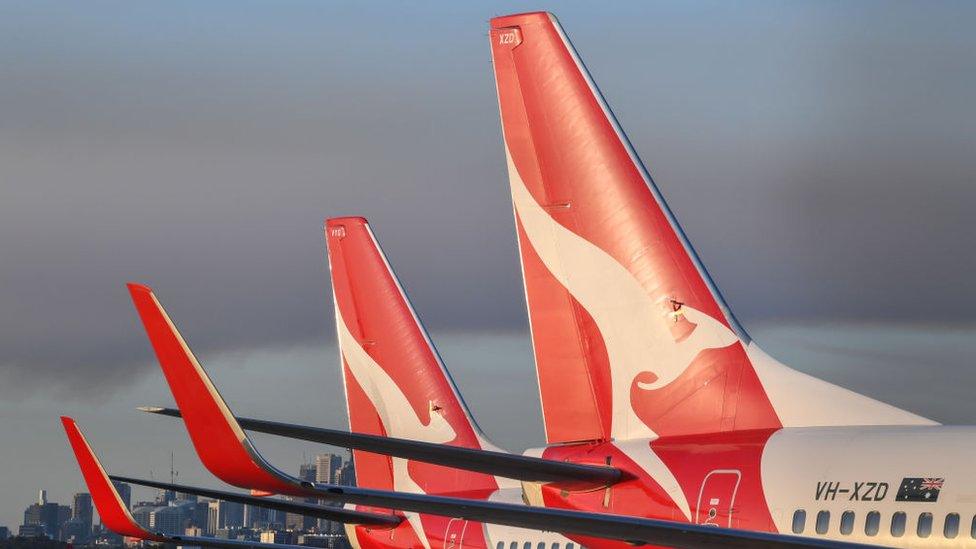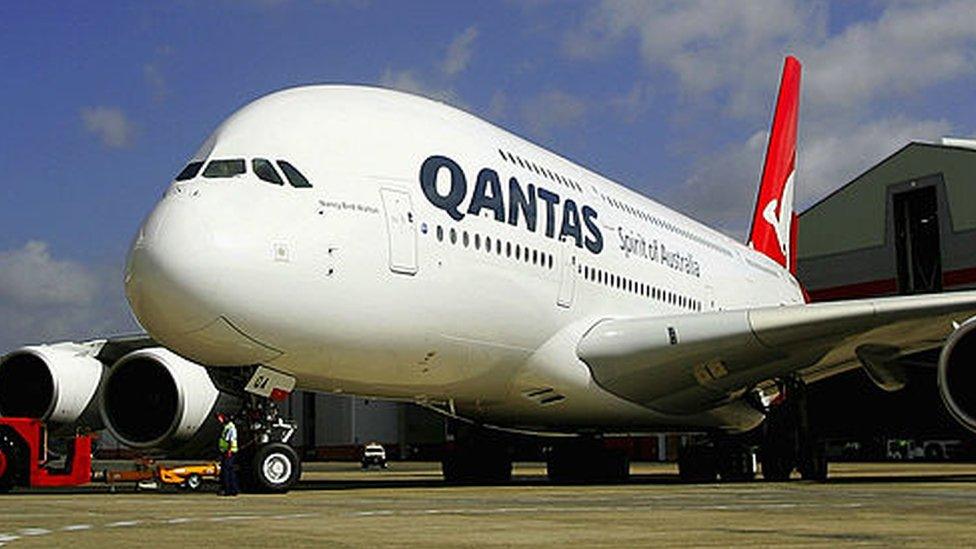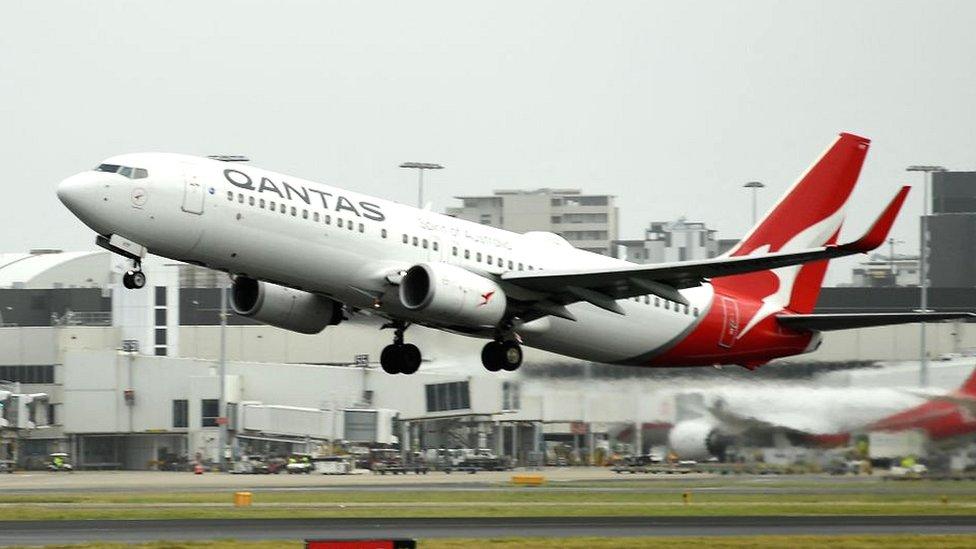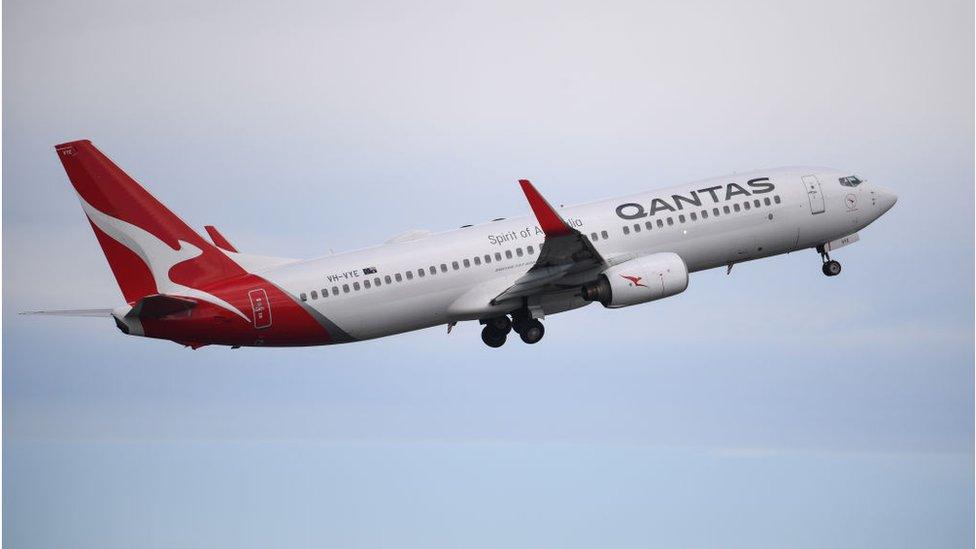Covid: Australia's Qantas says all staff must be vaccinated
- Published

Qantas said a poll of its 22,000 workers found that 89% of respondents had already been vaccinated or were planning to be
Qantas has said all of its employees must be vaccinated against Covid-19, making it the latest global airline to mandate jabs for staff.
Frontline workers including pilots, cabin crew and airport staff must be fully vaccinated by mid-November.
The company says its remaining employees have until the end of March next year to receive both doses.
It comes as the state of New South Wales reported its biggest daily rise in coronavirus infections.
The Australian flag carrier is the country's biggest, most high-profile company to introduce a mandatory vaccination policy.
"We provide an essential service, so this will help guard against the disruptions that can be caused by just one positive COVID-case shutting down a freight facility or airport terminal," Qantas chief executive Alan Joyce said in a statement.
"It's clear that vaccinations are the only way to end the cycle of lockdowns and border closures and for a lot of Qantas and Jetstar employees that means getting back to work again," he added.
Qantas said that a poll of its 22,000 staff found that 89% of respondents had already been vaccinated or were planning to be and around three-quarters of them thought it should be mandatory.
It said that 4% of the almost 12,000 who responded - around 480 staff - were unwilling or unable to get the vaccine.
The airline said that staff with documented medical reasons for not being able to be vaccinated would be given an exemption.

Controversial policy
Analysis by Simon Atkinson, BBC News in Australia
Qantas is essentially telling its staff to make a choice: jab or job.
The Flying Kangaroo has been hit harder by the pandemic than perhaps any other Australian business.
It has also been the largest recipient of government support payments - expected to be A$2bn (£1.1bn; $1.45bn) by the end of the year - to help it keep operating at a time when many of its planes are not.
But mandatory vaccination is a highly controversial policy here.
The latest Sydney outbreak has made the virus a very real problem for Australia - easing some vaccine hesitancy - but there are still plenty who do not want the jab.
And Prime Minister Scott Morrison has been adamant that, with the exception of those in specific industries (most notably aged care), nobody will be forced to take it. Even if firms do want to mandate it - the law is not on the side of the employers.
At the heart of this is workers' rights. And unions say the only ones making decisions about compulsory vaccinations should be public health officers - not companies.
It's yet to be tested in court. And that's why most big Australian employers are going down a different path - offering incentives to encourage vaccine uptake, rather than threats of redundancies.

Border closures caused by outbreaks of the highly contagious Delta variant in Sydney and Melbourne have led to Qantas making big cuts to its flight schedule.
Earlier this month, it temporarily stood down 2,500 workers.
The airline has already made around 8,500 workers redundant due to the pandemic, and is still operating very few international flights.
Qantas has previously said it will require all international passengers to be vaccinated once Australia's borders reopen.
Officials in New South Wales are struggling to contain a Delta outbreak in the state capital, Sydney.
On Wednesday, it reported 633 locally acquired Covid-19 cases, its biggest daily rise in infections.
Authorities announced three new deaths from the virus, taking the total number of deaths in the state from the latest outbreak to 60.
Australia's rollout of Covid vaccines is one of the slowest among the world's developed countries, with just over a quarter of the population vaccinated.
You may also be interested in:
Australia’s vaccine rollout a ‘colossal failure’, ex-PM Malcolm Turnbull says
Related topics
- Published3 August 2021

- Published20 May 2021

- Published21 March 2021
